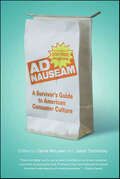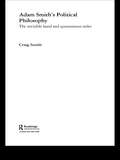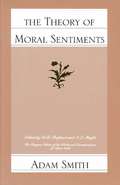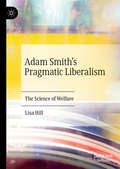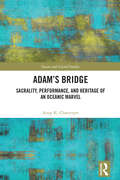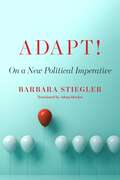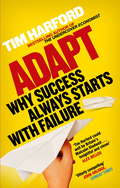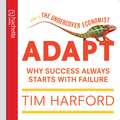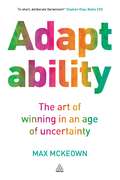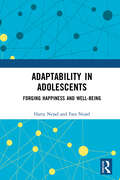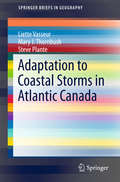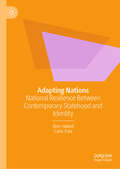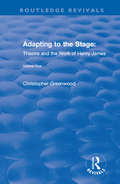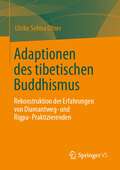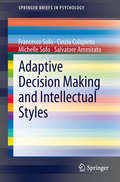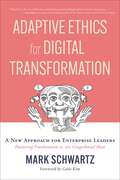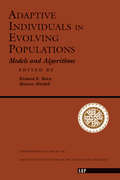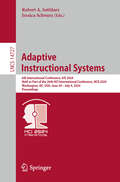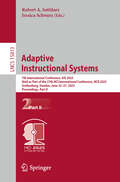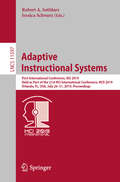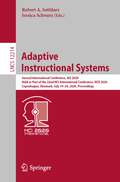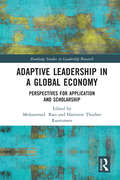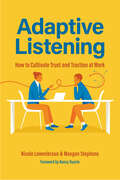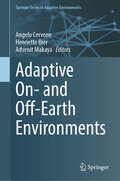- Table View
- List View
Ad Nauseam: A Survivor's Guide to American Consumer Culture
by Carrie McLaren and Jason TorchinskyWith the style and irreverence of Vice magazine and the critique of the corporatocracy that made Naomi Klein's No Logo a global hit, the cult magazine Stay Free!—long considered the Adbusters of the United States—is finally offering a compendium of new and previously published material on the impact of consumer culture on our lives. The book questions, in the broadest sense, what happens to human beings when their brains are constantly assaulted by advertising and corporate messages. Most people assert that advertising is easily ignored and doesn't have any effect on them or their decision making, but Ad Nauseam shows that consumer pop culture does take its toll.In an engaging, accessible, and graphically appealing style, Carrie McLaren and Jason Torchinsky (as well as contributors such as David Cross, The Onion's Joe Garden, The New York Times's Julie Scelfo, and others) discuss everything from why the TV program CSI affects jury selection, to the methods by which market researchers stalk shoppers, to how advertising strategy is like dog training. The result is an entertaining and eye-opening account of the many ways consumer culture continues to pervade and transform American life.
Adam Smith's Political Philosophy: The Invisible Hand and Spontaneous Order (Routledge Studies in Social and Political Thought #Vol. 42)
by Craig SmithWhen Adam Smith published his celebrated writings on economics and moral philosophy he famously referred to the operation of an 'invisible hand'. Adam Smith’s Political Philosophy makes visible this hand by examining its significance in Smith’s political philosophy and relating it to similar concepts used by other philosophers, thus revealing a distinctive approach to social theory that stresses the importance of the unintended consequences of human action. The first book to examine the history of Smith’s political philosophy from this perspective, this work introduces greater conceptual clarity to the discussion of the invisible hand and the related notion of unintended order in the work of Smith, as well as in political theory more generally. By examining the application of spontaneous order ideas in the work of Smith, Hume, Hayek and Popper, this important volume traces similarities in approach, and from these constructs a conceptual, composite model of an invisible hand argument. While setting out a clear framework of the idea of spontaneous order, the book also builds the case for using this as an explanatory social theory, with chapters on its application in the fields of science, moral philosophy, law and government.
Adam Smith: The Theory of Moral Sentiments
by Adam Smith D. D. Raphael A. L. MacfieMan's moral nature is influenced by sentiment and sympathy. The human ability to sympathize forms the psychological basis of man's desire to adhere to natural moral laws. Adam Smith explores ideas about individual freedom and self-interest, conscience and virtue, and a classic work of moral philosophy that remains relevant.
Adam Smith’s Pragmatic Liberalism: The Science of Welfare
by Lisa HillAdam Smith is commonly conceived as either an economist or a moral philosopher so his importance as a political thinker has been somewhat neglected and, at times, even denied. This book reveals the integrated, deeply political project that lies at the heart of Smith’s thought, showing both the breadth and novelty of Smith’s approach to political thought. A key argument running through the book is that attempts to locate Smith on the left-right spectrum (however that was interpreted in the eighteenth century) are mistaken: his position was ultimately dictated by his social scientific and economic thought rather than by ideology or principle. Through examining Smith’s political interests and positions, this book reveals that apparent tensions in Smith's thought are generally a function of his willingness to abandon, not only proto-liberal principles, but even the principles of his own social science when the achievement of good outcomes was at stake. Despite the common perception, negative liberty was not the be-all and end-all for Smith; rather, welfare was his main concern and he should therefore be understood as a thinker just as interested in what we would now call positive liberty. The book will uniquely show that Smith’s approach was basically coherent, not muddled, ad hoc, or ‘full of slips’; in other words, that it is a system unified by his social science and his practical desire to maximise welfare.
Adam’s Bridge: Sacrality, Performance, and Heritage of an Oceanic Marvel (Ocean and Island Studies)
by Arup K. ChatterjeeAdam’s Bridge offers the first comprehensive transdisciplinary study of the famous eponymous tombolo (also known as Ram Setu) combining its sacral, historical, geological, political, performative, and heritage aspects into one framework, viewed under the critical lenses of island studies and cultural theory. The book elucidates the entanglement of Adam’s Bridge’s discursive history with India’s colonial history, contemporary geology, domestic politics, and the nation’s emerging position in a complex geopolitical order in and around the Indian Ocean region, vis-à-vis increasing Sino-American involvement in Indo-Sri Lankan relations. Without foregrounding any absolute scientific claims on the location of the sandbars that inspired sage Valmiki’s Ram Setu and the Ramayan legacy or hindering narratives of religious faiths and folklore revolving around the structure, this intellectual historiography traces the parallel evolution of traditions of compassionate questioning and devotion for Indic sacred beliefs among commentators across the millennia from both Indian and non-Indian spectra, seen in juxtaposition with the biotic and abiotic diversity of the Gulf of Mannar and Palk Bay. Looking beyond secular-versus-religious debates, this book will be of interest to scholars of ocean and island studies, coastal economies, archipelagic geographies, environmental history, heritage studies, colonial studies, and cultural theory. Adam’s Bridge unifies a consortium of themes, ranging across ecological and livelihood sustainability, environmentalism, soteriology, economic and geostrategic history, and the United Nations Convention on the Law of the Sea, in conceptualizing a compellingly nuanced chronicle for India’s enchanted ‘bridge.’
Adapt!: On a New Political Imperative
by Barbara StieglerWinner, French Voices AwardThis book, a crossover hit in France, offers a fresh genealogy of our neoliberal moment.“We must adapt!” These words can be heard almost everywhere and in every aspect of our lives. Where does this widespread sense that we have fallen behind come from? How can we explain this progressive colonization of the economic, social, and political fields by this biological vocabulary of evolution? Offering a lucid account of sophisticated material, Barbara Stiegler uncovers the prehistories of today’s ubiquitous rhetoric in Darwinism and American liberalism, while, at the same time, recovering powerful resistances to the rhetoric of adaptation across the twentieth century.Walter Lippmann, an American theorist of this new liberalism, believed democracy was not adapted to the needs of globalization. Only a government of experts could force society to evolve, he argued. Lippmann thus found himself confronted with John Dewey, the great figure of American Pragmatism. Both Lippmann and Dewey labored under the impression that the world had changed and society needed to adapt. However, Lippmann did not trust society to adapt on its own and insisted on the need for experts who would force the necessary adaptation. Dewey, by contrast, believed the necessary adaptation could only come "from below" and should proceed in a democratic fashion. Focusing on readings of Michel Foucault, Walter Lippmann, and John Dewey, Adapt! paves the way for renewed insights into neoliberalism’s history, essence, characteristic forces, and impacts, as well as biopolitical theory. Stiegler presents an intriguing new genealogy for the development of neoliberalism, examining whether humans are by nature lagging and require biopolitical and disciplinary management to enforce adaptation. Stiegler also reorients Foucault’s genealogy of neoliberalism by emphasizing the Darwinian rhetoric of adaptation, as it arose in the Lippmann–Dewey Debate, and deftly handles the question of human nature in a way that re-enlivens this traditional concept. As the industrialization of our ways of life never stops destroying the environment and the health of organisms (climate disruption, the destruction of biodiversity, the growth of chronic diseases, the return of large pandemics), how can we think of a democratic government of life and the living? This is the question that Stiegler’s work helps us to confront.
Adapt: Why Success Always Starts with Failure
by Tim HarfordEverything we know about solving the world's problems is wrong. Out: Plans, experts and above all, leaders. In: Adapting - improvise rather than plan; fail, learn, and try againIn this groundbreaking new book, Tim Harford shows how the world's most complex and important problems - including terrorism, climate change, poverty, innovation, and the financial crisis - can only be solved from the bottom up by rapid experimenting and adapting.From a spaceport in the Mojave Desert to the street battles of Iraq, from a blazing offshore drilling rig to everyday decisions in our business and personal lives, this is a handbook for surviving - and prospering - in our complex and ever-shifting world.
Adapt: Why Success Always Starts with Failure
by Tim HarfordEverything we know about solving the world's problems is wrong. Out: Plans, experts and above all, leaders. In: Adapting - improvise rather than plan; fail, learn, and try againIn this groundbreaking new book, Tim Harford shows how the world's most complex and important problems - including terrorism, climate change, poverty, innovation, and the financial crisis - can only be solved from the bottom up by rapid experimenting and adapting.From a spaceport in the Mojave Desert to the street battles of Iraq, from a blazing offshore drilling rig to everyday decisions in our business and personal lives, this is a handbook for surviving - and prospering - in our complex and ever-shifting world.
Adaptability
by Max MckeownAll success is successful adaptation. All failure is a failure to adapt. Adaptability is about the powerful difference between adapting to cope and adapting to win. Fascinating real-world examples from business, government, and sport, military and wider society bring the rules of adaptability to life. From the world's most innovation corporations to street-level creativity emerging from the slums. From McDonalds to Sony, from post-war Iraq to the revolutions of the Arab Spring, from the bustling markets of Hong Kong to the rubber marked circuit of the Monte Carlo Rally. With insightful rules, Max Mckeown shows you how to increase the adaptability of your organization to create winning positions. Human history is a story of competition to adapt between groups and individuals. It has never been more important to understand how to think better and adapt.
Adaptability in Adolescents: Forging Happiness and Well-Being
by Harry Nejad Fara NejadThis book discusses a newly developed concept of adaptability capacity and development as an extension of Charles Darwin’s work on adaptability. It looks at how the human mind uses adaptability resources to deal with life-changing, challenging, and varying circumstances and conditions. The volume presents an integrative process model that assesses the roles of socio-demographic and ability covariates, personality, and other dispositional presage factors in predicting psychological well-being outcomes, such as life satisfaction, happiness, and self-esteem. While exploring the concept of adaptability capacity, the volume focuses on making children and adolescents mentally, emotionally, and behaviorally adaptable. It discusses general and domain-specific constructs relevant to phenomena such as self-regulation, resilience, buoyancy, and coping mechanisms. The book focuses on the development and utilization of treatments to assist individuals in becoming positively adaptable and achieve a higher degree of positive well-being and self-actualization. An important contribution, this book will be of interest to students, researchers and teachers of psychology, educational psychology, and social work. It will also be helpful for academicians, mental health professionals, social workers, psychiatrists, counsellors, and those working in related areas.
Adaptation to Coastal Storms in Atlantic Canada (SpringerBriefs in Geography)
by Mary J. Thornbush Liette Vasseur Steve PlanteThis Briefs is based on an analysis that was performed on the 2010 winter storms that caused considerable damage to coastal communities in Atlantic Canada. The hazards that occurred were associated with storm surge, coastal erosion, and flooding. The analysis covered a large multi-site longitudinal project, where a participatory action research (PAR) approach was used to understand how people in nine coastal communities perceive and experience extreme weather events and to enhance their capacity to adapt and improve their resilience. This Briefs exposes the outcome of two series of interviews and activities that were conducted during the project, as well as the lessons learned, and general elements that should be considered when researchers collaborate with communities to define adaptation and resilience strategies. It makes an important contribution to the application of PAR as an integrated (social-ecological) approach to resilience and how such an approach [. . . ] can be adapted also to other communities.
Adapting Nations: National Resilience Between Contemporary Statehood and Identity
by Carlo Pala Alon HelledNations adapt. Nations are resilient both within and outside the boundaries of statehood. Yet scholarship tends to downplay nationhood, as it focuses on the polity. As a consequence, the investigation of modern societies, though usually articulated around the nation-state model, falls into state-centrism, whilst neglecting the other side of the coin. This book initiates an interdisciplinary debate that encourages research in a field that has largely been overlooked in European social and political sciences. The analysis, offered by the authors, reinstates the concept of the 'nation' beyond the traditional, and somewhat dichotomous, schools of thought, hence neither judging the nation as a mere invention nor as a deterministic product of history. The book provides those interested in nationalism with new approaches to exploring national identity and its connection to statehood. By using concepts inspired by political science and sociology, namely habitus, survival unit, polity, hysteresis, and so forth, the different chapters of the volume revitalise the inquiry of the dimensions and features in which the nation and the identification they engender become tools of adaptation in relation to the transformative reality of our own contemporaneity. The authors thus contextualise the latter via the mid-range concept of national resilience at both meso- and macro-levels.
Adapting to the Stage: Theatre and the Work of Henry James
by Chris GreenwoodThis title was first published in 2000: The American novelist and playwright, Henry James, was drawn to the theatre and the shifting conventions of drama throughout his writing career. This study demonstrates that from the 1890s onwards James concentrated on adapting his novels and stories to and from the stage, and increasingly employed metaphors that spoke of novel-writing in terms of playwriting. Christopher Greenwood argues that these metaphors helped James to conceive himself as an artist who composed characters dramatically and visually, and in doing so sets his novels significantly apart from those of his contemporaries. In the introduction to the first part of the book, Greenwood examines James's career within the context of contemporary European and North American theatre, providing an appraisal of what James gained from contemporary theatre, his position in that milieu, and what he brought to it. Part 2 of the book focuses on two novels: "The Other House" and "The Spoils of Poynton", both of which illustrate the ways in which James used the mechanism of contemporary theatre to communicate a character's personality. Discussion of these two works is used to throw light on similar concerns that develop in James's later writing.
Adaptionen des tibetischen Buddhismus: Rekonstruktion der Erfahrungen von Diamantweg- und Rigpa-Praktizierenden
by Ulrike Selma OfnerWährend hierzulande die Kirchen immer geringeren Zuspruch erhalten, steigt das Interesse am Buddhismus. Darin drückt sich ein fortbestehendes Bedürfnis nach Spiritualität, einer Heilslehre und existentieller Tiefe aus. Tibetischer Buddhismus deckt zudem magisch-mystische Sehnsüchte. Dass dabei die um Vereinbarkeit mit westlicher Lebensweise bemühten Diamantweg- und Rigpa-Schulen die weitaus größte Anhängerschaft vorweisen, mag kein Zufall sein. Der hier gewählte methodologische Zugang gewährt intime Einblicke in Konversions- und Bleibemotive, den Praxisalltag sowie Veränderungen der Selbst- und Weltverhältnisse.
Adaptive Decision Making and Intellectual Styles (SpringerBriefs in Psychology #13)
by Salvatore Ammirato Francesco Sofo Cinzia Colapinto Michelle SofoThis exciting publication provides the reader with a theoretical and practical approach to adaptive decision making, based on an appreciation of cognitive styles, in a cross-cultural context. The aim of this Brief is to describe the role of thinking-through different options as part of the decision-making process. Since cognitive style influences decision behavior, the book will first examine thinking styles, which involve both cognitive and emotive elements, as habits or preferences that shape and empower one's cognition and emotion. The information contained in this Brief will be a useful resource to both researchers studying decision making as well as to instructors in the higher education sector and to human resource development practitioners, especially those working in international, multi-cultural companies.
Adaptive Ethics for Digital Transformation: A New Approach for Enterprise Leaders (Featuring Frankenstein vs. the Gingerbread Man)
by Mark SchwartzDigital transformation doesn't just raise ethical issues, it—in itself—is an ethical shift.Business leaders today are struggling to manage conflicting imperatives, those of the emerging digital world and those of the bureaucratic world of the past. The act of digital transformation requires a deep change in the moral outlook and ethical assumptions of a business. But how do we get there?Enterprise strategist and author Mark Schwartz shows how we need to learn to think differently about relationships with customers and employees. That the ethics of digital transformation is a matter of cultivating and applying virtues rather than applying rules. Ethics is not just a matter of refraining from doing bad things. It's a matter of building the world we want, and it's the job of company executives.Featuring a chapter on bullshit, a handy chart of excuses for bad behavior, and Schwartz's typically paradoxical blend of deep insight and pasta jokes, this book guides business leaders as they struggle to adapt their bureaucratic framework of ethics to the emerging landscape of the digital world. By the end of the book, business leaders will rethink what it takes to be an ethical organization.
Adaptive Individuals In Evolving Populations: Models And Algorithms
by Richard K. BelewThis book is out of a workshop organized to address questions like these. The meeting was sponsored by the Santa Fe Institute and held at Sol y Sam- bra in Santa Fe, New Mexico, during July, 1993. It brought together a group of about 20 scientists from the disciplines of biology, psychology, and computer science, all studying interactions between the evolution of populations and individuals’ adaptations in those populations, and all of whom make some use of computational tools in their work.
Adaptive Instructional Systems: 6th International Conference, AIS 2024, Held as Part of the 26th HCI International Conference, HCII 2024, Washington, DC, USA, June 29–July 4, 2024, Proceedings (Lecture Notes in Computer Science #14727)
by Jessica Schwarz Robert A. SottilareThis book constitutes the refereed proceedings of 6th International Conference on Adaptive Instructional Systems, AIS 2024, held as part of the 26th International Conference, HCI International 2024, which took place in Washington, DC, USA, during June 29-July 4, 2024. The total of 1271 papers and 309 posters included in the HCII 2024 proceedings was carefully reviewed and selected from 5108 submissions. The HCII-AIS 2024 contributions have been organized in the following topical sections: Designing and developing adaptive instructional systems; adaptive learning experiences; AI in adaptive learning.
Adaptive Instructional Systems: 7th International Conference, AIS 2025, Held as Part of the 27th HCI International Conference, HCII 2025, Gothenburg, Sweden, June 22–27, 2025, Proceedings, Part I (Lecture Notes in Computer Science #15812)
by Jessica Schwarz Robert A. SottilareThe two-volume set LNCS 15812-15813 constitutes the thoroughly refereed proceedings of the 7th International Conference on Adaptive Instructional Systems, AIS 2025, held as part of the 27th HCI International Conference on Human-Computer Interaction, HCII 2025, which took place in Gothenburg, Sweden, in June 2025. The total of 1430 papers and 355 posters included in the HCII 2025 proceedings was carefully reviewed and selected from 7972 submissions. The two volumes cover topics as follows: Part I: Adaptive Training and Education; Cognitive Modeling of Adaptive Instructional Systems; Part II: Adaptive and Personalized Learning; Emerging Technologies in Adaptive Instruction.
Adaptive Instructional Systems: 7th International Conference, AIS 2025, Held as Part of the 27th HCI International Conference, HCII 2025, Gothenburg, Sweden, June 22–27, 2025, Proceedings, Part II (Lecture Notes in Computer Science #15813)
by Jessica Schwarz Robert A. SottilareThe two-volume set LNCS 15812-15813 constitutes the thoroughly refereed proceedings of the 7th International Conference on Adaptive Instructional Systems, AIS 2025, held as part of the 27th HCI International Conference on Human-Computer Interaction, HCII 2025, which took place in Gothenburg, Sweden, in June 2025. The total of 1430 papers and 355 posters included in the HCII 2025 proceedings was carefully reviewed and selected from 7972 submissions. The two volumes cover topics as follows: Part I: Adaptive Training and Education; Cognitive Modeling of Adaptive Instructional Systems; Part II: Adaptive and Personalized Learning; Emerging Technologies in Adaptive Instruction.
Adaptive Instructional Systems: First International Conference, AIS 2019, Held as Part of the 21st HCI International Conference, HCII 2019, Orlando, FL, USA, July 26–31, 2019, Proceedings (Lecture Notes in Computer Science #11597)
by Jessica Schwarz Robert A. SottilareThis book constitutes the refereed proceedings of the First International Conference on Adaptive Instructional Systems, AIS 2019, held in July 2019 as part of HCI International 2019 in Orlando, FL, USA. HCII 2019 received a total of 5029 submissions, of which 1275 papers and 209 posters were accepted for publication after a careful reviewing process. The 50 papers presented in this volume are organized in topical sections named: Adaptive Instruction Design and Authoring, Interoperability and Standardization in Adaptive Instructional Systems, Instructional Theories in Adaptive Instruction, Learner Assessment and Modelling, AI in Adaptive Instructional Systems, Conversational Tutors.
Adaptive Instructional Systems: Second International Conference, AIS 2020, Held as Part of the 22nd HCI International Conference, HCII 2020, Copenhagen, Denmark, July 19–24, 2020, Proceedings (Lecture Notes in Computer Science #12214)
by Jessica Schwarz Robert A. SottilareThis volume constitutes the refereed proceedings of the Second International Conference on Adaptive Instructional Systems, AIS 2020, which was due to be held in July 2020 as part of HCI International 2020 in Copenhagen, Denmark. The conference was held virtually due to the COVID-19 pandemic.A total of 1439 papers and 238 posters have been accepted for publication in the HCII 2020 proceedings from a total of 6326 submissions. The 41 papers presented in this volume were organized in topical sections as follows: designing and developing adaptive instructional systems; learner modelling and methods of adaptation; evaluating the effectiveness of adaptive instructional systems.Chapter "Exploring Video Engagement in an Intelligent Tutoring System" is available open access under a Creative Commons Attribution 4.0 International License via link.springer.com.
Adaptive Leadership in a Global Economy: Perspectives for Application and Scholarship (Routledge Studies in Leadership Research)
by Mohammed RaeiWith the entire world experiencing the global pandemic and its aftermath, VUCA (Volatile, Uncertain, Complex, and Ambiguous) conditions have never been more extreme and the need for adaptive leadership never more urgent. But how is adaptive leadership applied outside Western cultures? How can it be taught through leadership development programs? Which tools enhance its practice and its teaching? How does adaptive leadership relate to other key theories and practices? This volume answers these questions and more as it illustrates how adaptive leadership practices address some of the world’s most pressing challenges-political and cultural division, remote work, crisis management-across a variety of sectors. Adaptive leadership has been explained as a key leadership approach for dealing with adaptive, as distinguished from technical or predictable, problems, especially prevalent in complex environments. However, adaptive leadership scholarship has suffered from a lack of conceptual clarity and casual application of its core concepts. It remains solidly Western in its prescriptions. This book will expand readers’ understanding of adaptive leadership and its potential to solve local and global adaptive challenges and will explore its relevance and application to cultures outside the United States. Aiming to increase conceptual clarity about adaptive leadership to enhance future scholarship and application and illustrate novel approaches and perspectives, this book will be of interest to researchers, academics, practitioners, and students in the fields of leadership, strategy, and organizational studies.
Adaptive Listening: How to Cultivate Trust and Traction at Work
by Nicole Lowenbraun Maegan StephensThere Isn’t One Way to Listen. It’s Time to Adapt Your Listening!“Adaptive Listening is incredible. [It] made me evaluate all aspects of my interactions in life.” ─Workshop participant from Cisco#1 New Release in Running Meetings & Presentations and Human Resources & Personnel ManagementAdaptive Listening is for those who want to improve the way they, and their teams, communicate up, down, across, internally, and externally. Through engaging stories and practical techniques, discover a new model for listening in the workplace.Not just another book on communication. Adaptive Listening helps you up-level the under-trained side of communication amidst the realities of a hectic workday. Researched and tested exclusively in the work setting, Adaptive Listening moves you beyond active listening, embracing easy-to-remember techniques that strengthen relationships and get work done more effectively. Leaders at all levels can improve listening skills. Aspiring, emerging, and established leaders can build more awareness about their own listening style and the impact it has on their workday. Only then can they adapt the way they listen to meet the goals and needs of direct reports, peers, managers, customers, and stakeholders, all while contributing to a positive workplace culture.Inside learn:How to leverage the strengths and avoid the pitfalls of your listening style by recognizing how you prefer to process and respond to informationHow to break away from ineffective listening and step into Adaptive Listening to meet the goals and needs of the person speaking How to reduce mistrust, misalignment, and miscommunication by being more mindful of the barriers that prevent you from using empathetic communicationHow to cue other listeners to listen in the way you want and needIf you enjoyed You’re Not Listening, Just Listen, Listen Like You Mean It, Power Listening, Nonviolent Communication, or Crucial Conversations, you’ll love Adaptive Listening.
Adaptive On- and Off-Earth Environments (Springer Series in Adaptive Environments)
by Henriette Bier Angelo Cervone Advenit MakayaThis volume investigates the challenges and opportunities for designing, manufacturing and operating off-Earth infrastructures in order to establish adaptive human habitats. The adaptive aspects are considered with respect to the development of adequate infrastructures designed to support human activities. Given the limitations in bringing materials from Earth, utilisation of in-situ resources is crucial for establishing and maintaining these infrastructures.Adaptive on-and off-Earth Environments focuses, among other aspects, on the design, production, and operation processes required to build and maintain such off-Earth infrastructures, while heavily relying on In-Situ Resource Utilisation (ISRU). Such design, production, and operation processes integrate cyber-physical approaches developed and tested on Earth. The challenge is to adapt on-Earth approaches to off-Earth applications aiming at technology advancement and ultimately transfer from on- to off-Earth research. Thischallenge is addressed with contributions from various disciplines ranging from power generation to architecture, construction, and materials engineering involving ISRU for manufacturing processes. All chapters, related to these disciplines, are structured with an emphasis on computing and adaptivity of on-Earth technology to off-Earth applications and vice versa to serve society at large.
